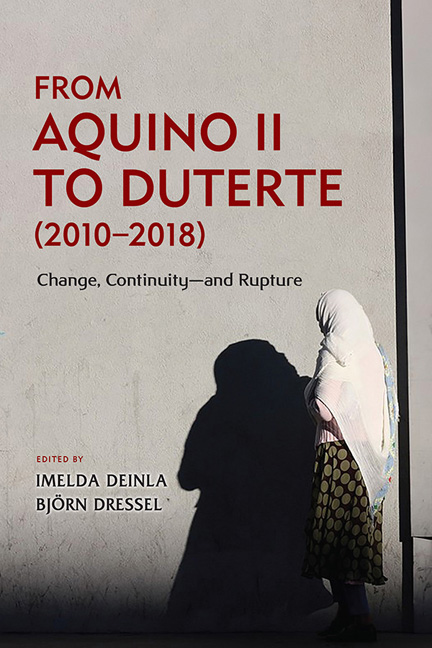Book contents
- Frontmatter
- Contents
- List of Tables
- List of Figures
- Acknowledgements
- Acronyms and Glossary
- Contributors
- Introduction: From Aquino II to Duterte (2010–2018): Change, Continuity—and Rupture 1
- PART I POLITICS AND GOVERNANCE
- PART II ECONOMIC GOVERNANCE
- PART III PEACE PROCESS IN MINDANAO
- 7 Prospects for Lasting Peace in Mindanao: Peacemaking and Peacebuilding under the Aquino and Duterte Administrations
- 8 Prospects for the Normalization Process in the Southern Philippines: An Architecture of Uncertainty?
- PART IV INTERNATIONAL ENVIRONMENT
- Index
8 - Prospects for the Normalization Process in the Southern Philippines: An Architecture of Uncertainty?
from PART III - PEACE PROCESS IN MINDANAO
Published online by Cambridge University Press: 31 January 2020
- Frontmatter
- Contents
- List of Tables
- List of Figures
- Acknowledgements
- Acronyms and Glossary
- Contributors
- Introduction: From Aquino II to Duterte (2010–2018): Change, Continuity—and Rupture 1
- PART I POLITICS AND GOVERNANCE
- PART II ECONOMIC GOVERNANCE
- PART III PEACE PROCESS IN MINDANAO
- 7 Prospects for Lasting Peace in Mindanao: Peacemaking and Peacebuilding under the Aquino and Duterte Administrations
- 8 Prospects for the Normalization Process in the Southern Philippines: An Architecture of Uncertainty?
- PART IV INTERNATIONAL ENVIRONMENT
- Index
Summary
INTRODUCTION
On 16 June 2015, more than a year after the signing of the Comprehensive Agreement on the Bangsamoro (CAB), with seventeen years of ceasefire and several decades of on-and-off peace talks, the Moro Islamic Liberation Front (MILF) dared to take a historic step and decommissioned 145 combatants and 75 firearms. This step in the peace process was not only a clear commitment to a political solution by the government to the “Bangsamoro question” but also part of the elaborate pattern of agreements reached between both sides in the last years. To achieve normalization—a return to a peaceful and stable life for communities—is the ultimate goal of the peace agreement.
But Mindanao's woes and worries cannot be isolated from the conflict between the Government of the Philippines (GPH) and the MILF—although many issues are strongly intertwined with this major conflict trajectory. The situation on the ground is often very complicated and different layers of armed violence, armed groups and governance systems will challenge the implementation period of the peace process. Apart from journalistic pieces and a limited number of essays, little has been written about this normalization period initiated after the CAB—or scholarly reviews or assessments of demobilization and disarmament published. The lack of published material is not surprising, considering the initiated formal process of normalization is only recent.
This chapter will look back at the foundations of normalization—in particular security aspects—as well as examine future prospects and trajectories. This is part of the broader scholarship on the Mindanao conflict and also an initial study on demobilization of combatants in a post-conflict situation. Existing literature on Disarmament, Demobilization and Reintegration (DDR) and Mindanao, official documents and peace agreements between GPH and MILF, media articles, press statements and fieldwork—community immersion, interviews, participant observation— undertaken in the southern Philippines between 2012 and 2015, are discussed. The first section outlines the history of conflicts in the southern Philippines, including some notions on the particularities and characteristics of these conflicts. DDR is discussed before the third section outlines the Moro National Liberation Front (MNLF) following the 1996 Final Peace Agreement (FPA)–DDR efforts with other groups in the Philippines.
- Type
- Chapter
- Information
- From Aquino II to Duterte (2010–2018)Change, Continuity—and Rupture, pp. 239 - 262Publisher: ISEAS–Yusof Ishak InstitutePrint publication year: 2019



